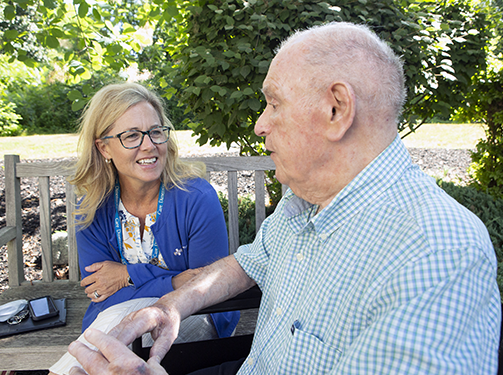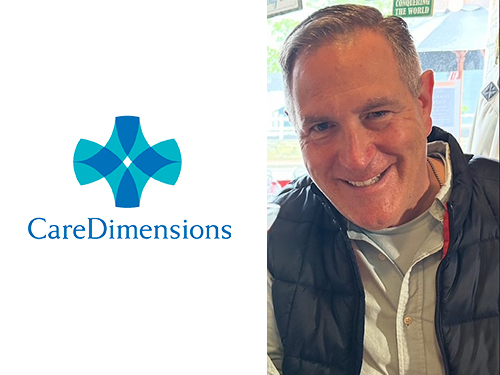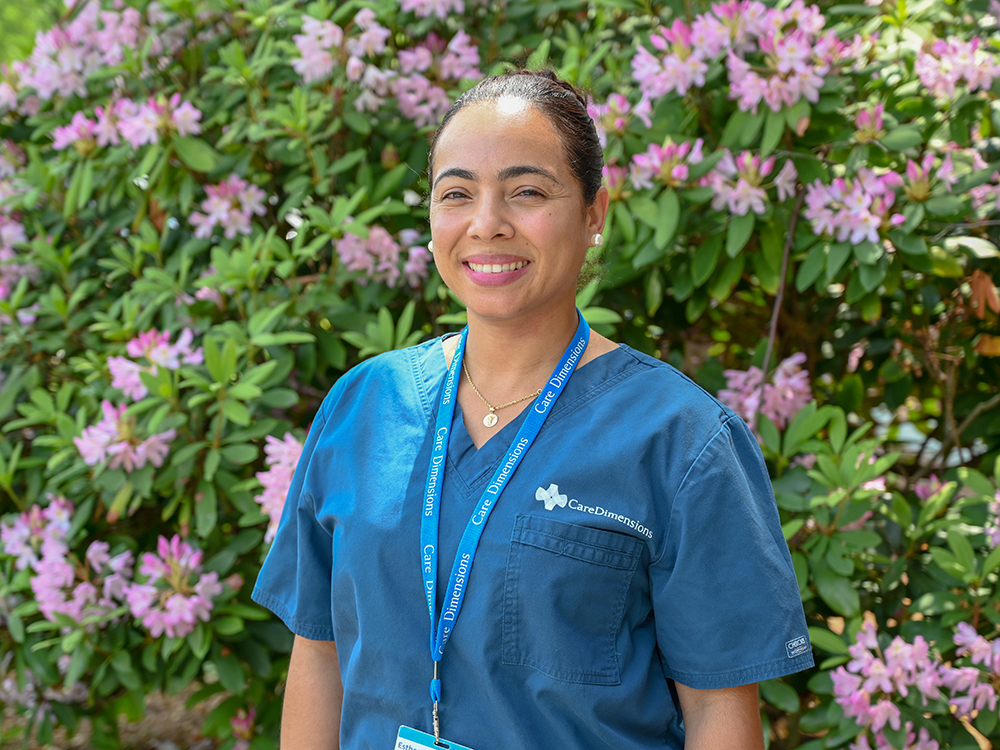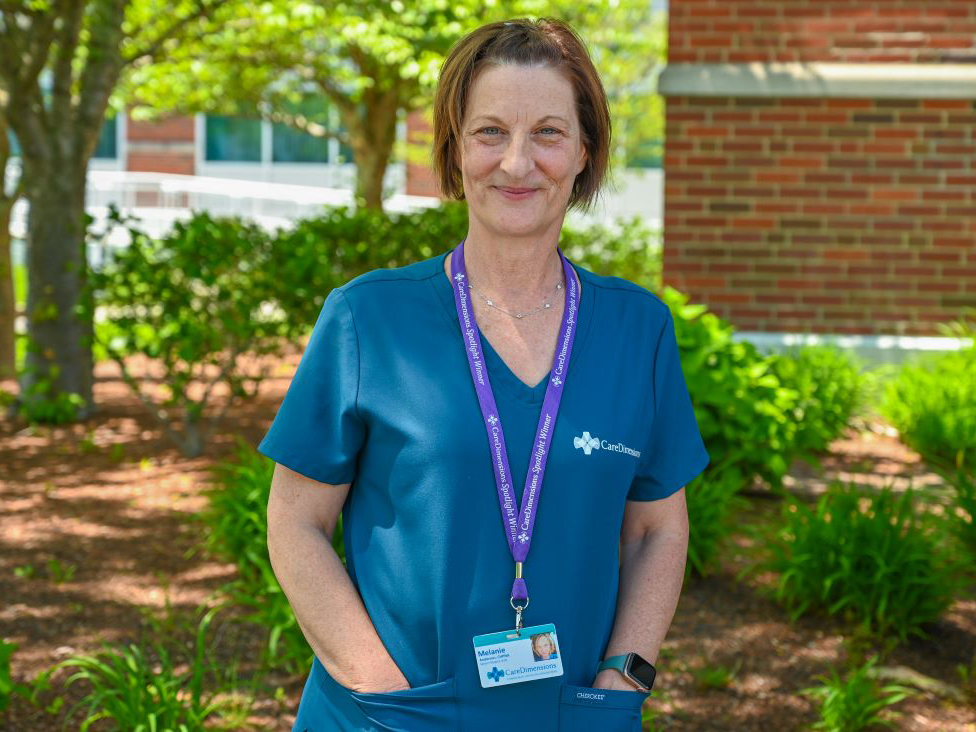How can we help?
888-283-1722
Call us now at 888-283-1722
24/7 Referrals and Nursing Support
Voices of Care Blog

Why We Chose Hospice Social Work
Posted on March 18, 2024 by Lisa ContiIn observance of Social Work Month, two Care Dimensions social workers, Jennifer Khudairi and Cheshire Schanker, discuss what attracted them to their profession, lessons learned, and what they’ve found fulfilling about hospice social work. Jennifer has been with Care Dimensions since 2018; Cheshire joined our team in 2017.
Why did you become a hospice social worker?
Jennifer Khudairi: I became a social worker in mid-life. I was in social work school when my father died suddenly. Unfortunately, he died in a hospital’s intensive care unit, but I remember thinking there must be a better way. I knew about hospice care as my mother had been a hospice social worker in the 1980s during the AIDS epidemic, but I hadn’t thought of it as a career focus for myself. Not long after my father died, I took a course on Death and Dying and was assigned to read Atul Gwande’s book, “Being Mortal.” Reading that book was a “WOW” moment for me, and I have been committed to the hospice mission ever since then.
Cheshire Schanker: There was a natural progression to my social work career. Through my Master of Social Work internship, I had become interested in medical social work. As I explored different facets of that world, the interdisciplinary nature of hospice and its combination of clinical and practical support appealed to me. This is my third job as a social worker, and I am very happy with where I landed.
What do you find fulfilling about hospice social work?
Jennifer: I’ve always been a strong collaborator, so I love being part of a team that is working towards the same goal of someone’s end-of-life comfort. Like many in the “helping professions,” I enjoy making a difference in someone’s life – whether it is a patient, caregiver, or colleague – just by listening and letting them know that they matter. I also appreciate opportunities to educate others that hospice doesn’t need to be a scary prospect. Many people are surprised to learn that hospice isn’t about dying so much as it is about providing physical, emotional, and spiritual comfort, which can allow patients to enjoy the time they have left.
Cheshire: Working in hospice and witnessing many deaths, we develop a unique expertise. Many individuals and families have very limited experience with death, or none. To be a calm, supportive, informative presence during this intense and often challenging journey is invaluable. We see families harmoniously come together and struggle to be together – both out of love. Doing this work gives you the ability to bear witness to it all.
What are some lessons you’ve learned as a hospice social worker?
Jennifer: The biggest lesson for me is the importance of perseverance. I have heard so many life stories and am always struck by those who have overcome personal tragedies and tremendous challenges and remained hopeful throughout their lives. Letting go also is important. It can be difficult to resist the desire to control the outcome. I sometimes encounter patients who would most likely be better off with increased supervision for safety reasons, but sometimes, despite the all the education we provide, patients choose to remain alone. If that patient understands the risks, we must accept that choice.
Cheshire: I am truly learning constantly from our patients, families, and my co-workers. This job makes me reflect on my own values and how I am present for those I love. It has also taught me appreciation for the minutiae of everyday that so often comprises our patients’ favorite stories.
What’s one of your favorite memories with a hospice patient?
Jennifer: I can’t say I have a favorite memory, but the patients who have remained in my memory long after they have passed were open to sharing their life stories with me. They looked forward to my visits and I saw them frequently. I had one patient who referred to Wednesday as her “hospice day” because we hospice team members all visited her on Wednesdays. She died on a Wednesday, and we all got a chance to say “goodbye” to her. That felt very special.
Cheshire: I was seeing a 101-year-old patient who was fiercely independent and lived alone in an apartment. Her sole living relative was a son with disabilities who could provide only minimal support. Her condition was declining, and she was struggling to get into her bed, which had a box spring and was high off the floor. She had been sleeping in a living room chair, which caused fluid to build up in her legs and exacerbated her challenges. Every member of the hospice team had visited and tried to convince her to allow us to order a hospital bed, which she could keep in the low position and use more easily. During one of my visits, she shared that she could not agree to this because she did not have anyone to help rearrange her furniture to make space for a hospital bed. The next day, the doctor, nurse, and I arrived at her apartment ready to work. Under her direction, we transformed her bedroom. Later that day, the hospital bed was delivered and set up. The patient loved having the hospital bed and lived another two years with the support of her Care Dimensions team. I remember that visit so fondly, not only because of my affection for the patient, but also because of every team member’s willingness to pitch in and create a solution for this patient. I have always loved the team aspect of this work and my appreciation of that has only grown in my work at the Care Dimensions Hospice House.
Video: Social Workers in Hospice
Learn about careers with Care Dimensions.
Sign up for our Careers e-newsletter.
Additional Posts
Not All Spiritual Care Involves Prayer – Sometimes It's About Popcorn
Posted on October 19, 2025 by Stephen Thompson Kohut, Spiritual Counselor in Hospice, Hospice careersNot everyone is religious, but Steve Kohut believes most people are spiritual. That's where his role as a hospice spiritual counselor comes in. ...
Continue readingSupporting Life's Final Journey: My Path as a Hospice Aide
Posted on June 16, 2025 by Esther Rodriguez, Hospice Aide in Hospice careersHospice Aide Esther Rodriguez explains what drew her to end-of-life care and how she helps families understand that hospice is about quality of life and dignity. ...
Continue readingFinding My Calling: My Journey as a Hospice Aide
Posted on June 9, 2025 by Melanie Anderson, Senior Hospice Aide in Hospice careersSenior Hospice Aide Melanie Anderson discusses what drew her to hospice and what she enjoys most about working at Care Dimensions. ...
Continue readingAnyone—patient, family, care provider—can make a referral. Fill in the form online or call us today.
Since 1978, Care Dimensions, formerly Hospice of the North Shore, has provided comprehensive and compassionate care for individuals and families dealing with life-threatening illnesses. As the non-profit leader in advanced illness care, we offer services in over 100 communities in Massachusetts.
Copyright 2026 | Care Dimensions, 75 Sylvan Street, Suite B-102, Danvers, MA 01923 | 888-283-1722 | 978-774-7566 |









